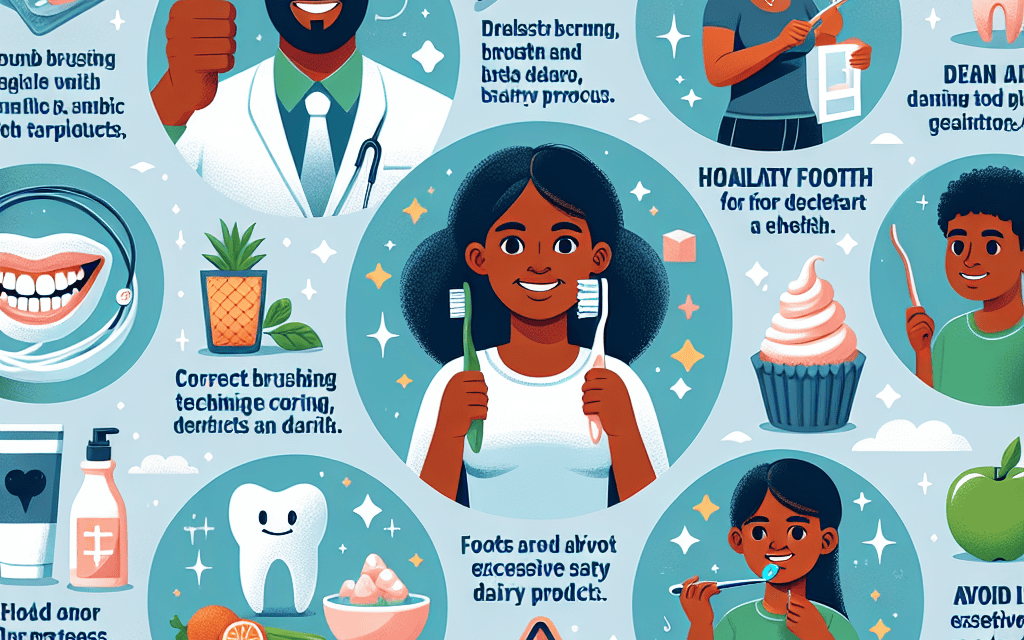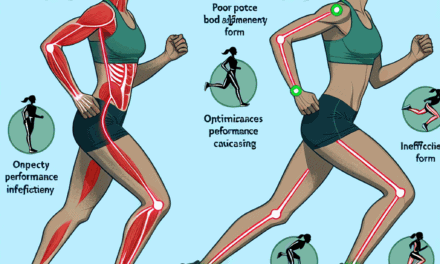Tips for Maintaining Optimal Dental Health and Preventing Emergencies
Maintaining optimal dental health is crucial not only for a beautiful smile but also for overall health and well-being. Poor dental hygiene can lead to a myriad of problems, including cavities, gum disease, and even systemic health issues. This article will explore essential tips for maintaining dental health and preventing emergencies, structured into five key subtopics: daily oral hygiene practices, the importance of regular dental check-ups, dietary choices for dental health, understanding dental emergencies, and the role of lifestyle choices in oral health.
Daily Oral Hygiene Practices
Daily oral hygiene is the foundation of good dental health. It involves a combination of brushing, flossing, and rinsing to remove plaque and food particles that can lead to tooth decay and gum disease.
Brushing Techniques
Brushing your teeth is the most critical aspect of oral hygiene. The American Dental Association (ADA) recommends brushing at least twice a day with fluoride toothpaste. Here are some effective brushing techniques:
- Use the Right Toothbrush: Choose a toothbrush with soft bristles to avoid damaging your gums. Electric toothbrushes can also be more effective in removing plaque.
- Brush for Two Minutes: Spend at least two minutes brushing your teeth. Divide your mouth into four quadrants and spend 30 seconds on each.
- Angle Your Brush: Hold your toothbrush at a 45-degree angle to your gums and use gentle circular motions to clean the outer and inner surfaces of your teeth.
- Don’t Forget Your Tongue: Bacteria can accumulate on your tongue, leading to bad breath. Gently brush your tongue or use a tongue scraper.
Flossing: An Essential Step
Flossing is often overlooked but is essential for removing plaque and food particles from between teeth where a toothbrush cannot reach. The ADA recommends flossing at least once a day. Here’s how to do it correctly:
- Use Enough Floss: Cut about 18 inches of dental floss and wind it around your middle fingers, leaving about 1-2 inches to work with.
- Be Gentle: Slide the floss between your teeth gently, curving it around each tooth in a C-shape. Avoid snapping the floss, which can damage your gums.
- Don’t Forget the Back Teeth: Make sure to floss the back teeth, as they are often neglected.
Rinsing with Mouthwash
Using an antimicrobial mouthwash can help reduce plaque, gingivitis, and bad breath. Look for mouthwashes that contain fluoride for added protection against cavities. Rinse according to the instructions on the label, usually for about 30 seconds.
Establishing a Routine
Creating a consistent oral hygiene routine is vital. Set reminders on your phone or use a calendar to ensure you brush and floss daily. Consider keeping your toothbrush and floss in visible places to encourage regular use.
Monitoring Your Oral Health
Pay attention to any changes in your mouth, such as bleeding gums, persistent bad breath, or tooth sensitivity. These could be signs of underlying issues that require professional attention. Keeping a dental diary can help track any changes and facilitate discussions with your dentist during check-ups.
The Importance of Regular Dental Check-Ups
Regular dental check-ups are essential for maintaining optimal dental health. The ADA recommends visiting the dentist at least twice a year for professional cleanings and examinations.
Early Detection of Dental Issues
One of the primary benefits of regular dental visits is the early detection of potential problems. Dentists can identify issues such as cavities, gum disease, and oral cancer in their early stages, making treatment more effective and less invasive. For example, a study published in the Journal of Dental Research found that early intervention in gum disease can prevent tooth loss and other complications.
Professional Cleanings
Even with diligent home care, plaque and tartar can build up on teeth. Professional cleanings remove this buildup, reducing the risk of cavities and gum disease. During a cleaning, dental hygienists use specialized tools to clean hard-to-reach areas and polish teeth, leaving them smooth and shiny.
Personalized Oral Health Advice
During your visit, your dentist can provide personalized advice based on your oral health status. This may include recommendations for specific products, techniques, or lifestyle changes to improve your dental health. For instance, if you have a history of cavities, your dentist may suggest fluoride treatments or sealants to protect your teeth.
Monitoring Overall Health
Dental health is closely linked to overall health. Regular dental visits allow your dentist to monitor signs of systemic conditions such as diabetes, heart disease, and even certain cancers. For example, research has shown that individuals with gum disease are at a higher risk for heart disease, making dental check-ups an essential part of preventive healthcare.
Building a Relationship with Your Dentist
Establishing a good relationship with your dentist can lead to better communication and trust. This relationship encourages you to be more open about your dental concerns and allows your dentist to provide tailored care. Regular visits also help you feel more comfortable during procedures, reducing anxiety associated with dental work.
Dietary Choices for Dental Health
Your diet plays a significant role in your dental health. Certain foods can promote healthy teeth and gums, while others can contribute to decay and other issues.
Foods to Embrace
Incorporating a variety of nutrient-rich foods into your diet can support oral health:
- Dairy Products: Foods like milk, cheese, and yogurt are high in calcium and phosphates, which help strengthen tooth enamel.
- Fruits and Vegetables: Crunchy fruits and vegetables, such as apples and carrots, can help clean teeth and stimulate gums. They are also rich in vitamins and minerals that support overall health.
- Nuts and Seeds: These are excellent sources of healthy fats and proteins. Almonds, for example, are high in calcium and can help protect teeth.
- Whole Grains: Whole grains provide essential nutrients and fiber, which can help maintain healthy gums.
Foods to Avoid
Some foods can be detrimental to your dental health:
- Sugary Snacks and Beverages: Sugar is a primary contributor to tooth decay. Bacteria in the mouth feed on sugar, producing acids that erode enamel.
- Acidic Foods: Citrus fruits, soda, and vinegar can erode tooth enamel over time. If consumed, rinse your mouth with water afterward to neutralize acids.
- Sticky Foods: Foods like caramel and gummy candies can cling to teeth, increasing the risk of cavities.
The Role of Hydration
Staying hydrated is essential for maintaining saliva production, which helps wash away food particles and neutralize acids in the mouth. Drinking water throughout the day can help keep your mouth moist and reduce the risk of decay.
Timing of Meals
Frequent snacking can increase the risk of cavities. Try to limit snacking between meals and opt for healthier choices when you do snack. If you consume sugary or acidic foods, try to do so during meals rather than as standalone snacks to minimize their impact on your teeth.
Supplements for Dental Health
In some cases, dietary supplements may be beneficial for dental health. For example, calcium and vitamin D supplements can support bone health, including the jawbone that supports your teeth. Consult with your healthcare provider before starting any supplements to ensure they are appropriate for your needs.
Understanding Dental Emergencies
Dental emergencies can happen at any time, and knowing how to respond can make a significant difference in the outcome. Understanding common dental emergencies and how to handle them is crucial for maintaining dental health.
Common Dental Emergencies
Some of the most common dental emergencies include:
- Toothache: A toothache can be caused by various issues, including cavities, gum disease, or a cracked tooth. Rinse your mouth with warm salt water and take over-the-counter pain relievers until you can see a dentist.
- Knocked-Out Tooth: If a tooth is knocked out, handle it by the crown (the top part) and rinse it gently. If possible, place it back in the socket or keep it in a container of milk until you can see a dentist.
- Cracked or Fractured Tooth: Rinse your mouth with warm water and apply a cold compress to reduce swelling. Avoid chewing on that side of your mouth until you can see a dentist.
- Lost Filling or Crown: If a filling or crown comes loose, try to keep the area clean and avoid chewing on that side. You can use dental cement or temporary filling material from a pharmacy as a temporary fix until you see your dentist.
When to Seek Emergency Care
Not all dental issues require immediate attention, but some situations do warrant emergency care. Seek immediate help if you experience:
- Severe pain that does not subside with over-the-counter medication.
- Swelling in the face or mouth, which could indicate an infection.
- Bleeding that does not stop after 10 minutes of applying pressure.
- A knocked-out tooth that you cannot reinsert or keep in milk.
Preventing Dental Emergencies
While not all dental emergencies can be prevented, there are steps you can take to reduce the risk:
- Wear a Mouthguard: If you play contact sports, wearing a mouthguard can protect your teeth from injury.
- Avoid Hard Foods: Be cautious with hard foods that can crack teeth, such as ice or hard candies.
- Practice Good Oral Hygiene: Maintaining good oral hygiene can prevent issues that may lead to emergencies.
Creating an Emergency Plan
Having a plan in place for dental emergencies can help you respond quickly and effectively. Keep your dentist’s contact information readily available, and know the location of the nearest emergency dental clinic. Consider discussing emergency procedures with your dentist during regular visits.
Educating Yourself and Your Family
Educating yourself and your family about dental emergencies can empower you to act quickly when needed. Discuss common scenarios and appropriate responses with your children, ensuring they know how to handle dental issues if they arise.
The Role of Lifestyle Choices in Oral Health
Your lifestyle choices significantly impact your dental health. Factors such as smoking, alcohol consumption, and stress can contribute to oral health issues.
The Impact of Smoking
Smoking is one of the most detrimental habits for oral health. It increases the risk of gum disease, tooth loss, and oral cancer. Smokers are also more likely to experience bad breath and stained teeth. Quitting smoking can lead to significant improvements in oral health, including better gum health and reduced risk of oral cancer.
Alcohol Consumption
Excessive alcohol consumption can lead to dry mouth, which increases the risk of cavities and gum disease. Alcohol can also contribute to oral cancer. Moderation is key; if you choose to drink, do so responsibly and maintain good oral hygiene practices.
Managing Stress
Stress can lead to behaviors that negatively impact dental health, such as teeth grinding (bruxism) and neglecting oral hygiene. Finding healthy ways to manage stress, such as exercise, meditation, or hobbies, can help protect your teeth and gums.
Regular Exercise and Its Benefits
Regular physical activity is not only beneficial for overall health but also for oral health. Exercise improves blood circulation, which can enhance gum health. Additionally, staying active can help manage stress levels, reducing the likelihood of stress-related dental issues.
Sleep and Oral Health
Quality sleep is essential for overall health, including oral health. Poor sleep can lead to increased stress and a weakened immune system, making it harder for your body to fight off infections, including those in the mouth. Aim for 7-9 hours of quality sleep each night to support your overall well-being.
Conclusion
Maintaining optimal dental health requires a multifaceted approach that includes daily oral hygiene practices, regular dental check-ups, mindful dietary choices, understanding dental emergencies, and making healthy lifestyle choices. By implementing these tips, you can significantly reduce the risk of dental issues and emergencies, ensuring a healthy smile for years to come.
Remember, your oral health is a vital component of your overall health. Prioritize your dental care, stay informed about best practices, and don’t hesitate to seek professional help when needed. A proactive approach to dental health will not only enhance your smile but also contribute to your overall quality of life.





